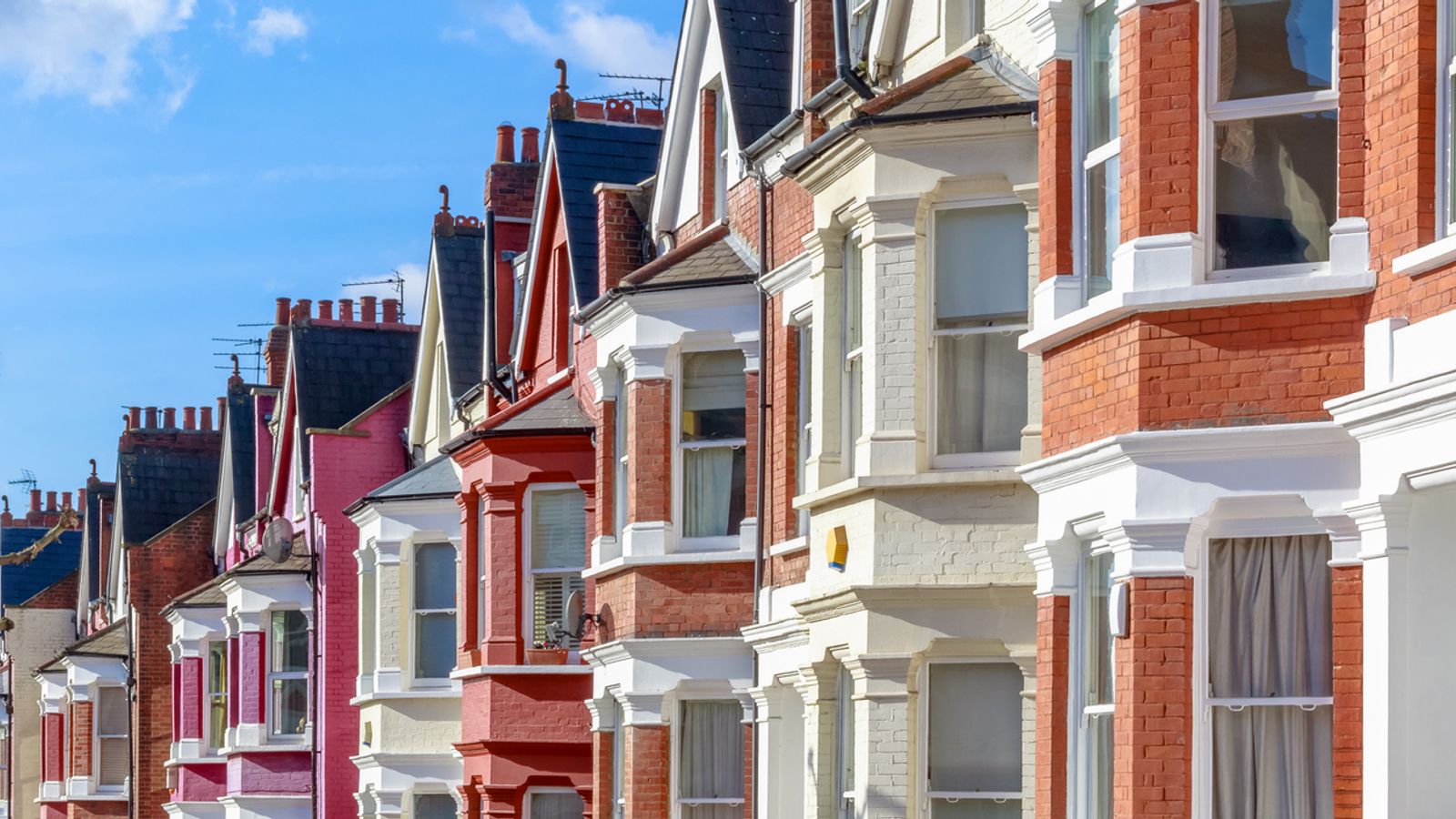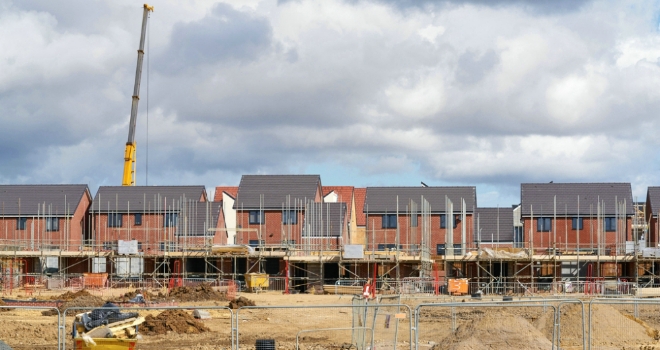Get another example of the free market in action? 😉
2024 Election thread
Comments
-
Get another example of the free market in action? 😉
The above may be fact, or fiction, I may be serious, I may be jesting.
I am not sure. You have no chance.Veronese68 wrote:PB is the most sensible person on here.0 -
Well that is entirely the point! The free market is utterly hamstrung by planning and other regulations and the endless local objections.
The entire system is obviously making in uneconomical for housebuilders to build enough housing to meet the needs of the growing population.
0 -
This *shrug your shoulders, nothing can be done* attitude from the people who have only benefited from this is utterly infuriating, and is partly why I believe that the political divide has become age.
0 -
Have you considered that an increasing population and your 'bring as many people into the country as possible' appraoch to immigration might be contributing to the problem?
"I spent most of my money on birds, booze and fast cars: the rest of it I just squandered." [George Best]0 -
The problems caused by lowering immigration are all to see, and have been done to death. Depopulation is even worse than this, so it's mad to go down that road. Bluntly, we are going to have a big drain on resource as boomers all retire and require care, and the current environment is putting the current fertile generations off having children or as many, so there is a serious demographic problem that can only be solved by immigration.
The benefits of immigration are obvious to everyone. This is not an immigration problem - it would be the same if everyone was popping out kids everywhere.
The cost of housing problem is a housing problem.
0 -
Yeahbut new builds are going to be priced at market values, i.e. over priced.
And take decades.
The above may be fact, or fiction, I may be serious, I may be jesting.
I am not sure. You have no chance.Veronese68 wrote:PB is the most sensible person on here.0 -
The objections from people who already own a home is a major problem. Government after Government has promised reform to the system but then backtrack when it feels like there is opposition or even introduce other laws that are designed to give locals more of a voice to object such as localism. A new National Planning Policy Framework came out just before Christmas that seems to contradict itself in places from the commentary I've read on it, it is also a bit unclear how tough the Government will be on Councils that fail to set or hit housing supply targets. On the plus side I think it was Bracknell that got a bollocking before Christmas for lack of progress on their Local Plan that could ultimately see decisions taken out of the hands of the Council. A system where Councillors can block applications that fully comply with their own policies and against the recommendations of their own experts is seriously flawed. Open up more land and the value of the available land will drop which will help reduce costs. The only way to get more housing (open market or social) is to get this system fixed and then to get far more genuinely affordable housing built whether through the public sector or not-for-profit organisations.
We'll also need to get far more tradespeople trained up but since the mid 1990s there has been far too much emphasis on young people going to University and getting a degree that may or may not be relevant to their future and very little into training people in non-academic industries.
It is an issue around the globe but there are also places such as Italy where they are virtually giving away housing (albeit that needs renovation) to encourage younger people to their area.
1 -
-
Posting charts and whining doesn't help either.
The above may be fact, or fiction, I may be serious, I may be jesting.
I am not sure. You have no chance.Veronese68 wrote:PB is the most sensible person on here.0 -
I am not convinced the problem is worse here than elsewhere. That's just a form of British exceptionalism. Nor that a housing free for all will work, because there are relatively few restrictions in some of these places.
New Zealand is another one. Prices there are brutal. Much worse than here.
0 -
The laws of supply and demand apply to housing as well: I'm sure you understand that as you've posted graphs on that sort of thing before. Ignoring the demand side is not a sensible way to solve the issues.
"I spent most of my money on birds, booze and fast cars: the rest of it I just squandered." [George Best]0 -
Italy has a depopulation problem in a lot of areas. They are even more aged than the UK is.
I totally agree ^^ though I would be more radical.
0 -
I wouldn't. My village is going to double in size from 2015 to 2025 and become a town. No objections.
Note that the "affordable" ones are still 10x salary, and the vast majority are not "affordable".
The above may be fact, or fiction, I may be serious, I may be jesting.
I am not sure. You have no chance.Veronese68 wrote:PB is the most sensible person on here.0 -
-
Ditto Exeter. My only gripe is that the Exeter boundaries need to change to include all the new developments within Exeter City Council, rather than at the fringes of Teignbridge & East Devon, and that there's more/better provision for people to get into the city centre without cars.
0 -
Personally the presumption that you are due all things the previous generation had is unhelpful. The issue, as much as anything, is expectation Vs reality.
A lot of the bleeting is about a wishlist you can't have all of. Close to London, cheap, for example. Never going to happen.
But you could afford a 7 bedroom mansion in Ayrshire and commute to Glasgow in the same time. Or compromise with a 4 bed townhouse in Edinburgh and walk to work. But you have a vanity about London Vs ambition and are unwilling to compromise.
I'm in a larger house now, but I couldn't afford a semi detached on a busy road where I grew up, even though those houses used to be affordable for the joiner working in our school and I'm earning about 5 times the equivalent now.
Poor me. Poor poor me.
Or deal with it.
Your choice.
1 -
My radical solution is to build loads of houses on green space if necessary and then start demolishig the ancient housing stock to create new green spaces. Prime for demolition would be all those large detahed houses in big plots that were popular in the late 19th / early 20th century, replace them with lots of public open spaces and denser, more energy efficient modern housing stock. You could probably double the housing in some of the Home Counties whilst ending up with the same amount of green space after a transion period. I don't think I'd get elected on that policy though.
We also need a huge increase in infrastrcuture alongside new housing. It's essential that people can undertake their lives with minimal reliance on private cars whether that is having digital infrastructure to improve remote working or significantly increased public or active travel options.
Unfortunately it's a pipe dream and the best we'll get in some tinkering to slightly increase housing provision.
0 -
Firstly, I do deal with it. I've doubled my pay over the past 3 years, and i'm in the top percentile for households earning wise - even with only 1 earner. I am doing my bit, and doing it well, bluntly. Just because I complain about it doesn't mean I'm not doing anything about it. I am one of that 20% of homeowners - through no inheritance either. Just work and savings. You won't find many people at 35 who can say that.
Secondly, your example with Glasgow versus London is precisely the stupid logic that I explained further up. I would not be able to afford a 7 bed in Glasgow, *because the earning potential is not there*. That is why I can afford a 7 bed Glaswegian house on London pay, because the pay in Glasgow isn't anything like London.
Affordability is also about what you're able to earn somewhere. That's why the prices are what they are. The kind of person who can afford your 7 bed Glasgow, isn't earning that wage in Glasgow. It is a market, right? Supply and demand.
0 -
This is broadly what I think.
I think I probably fit exactly into RC's idea of a "Boomer". I'm 58, have paid my mortgage off and have two daughters in their 20s and 30s. I make no bones about it, compared to the younger generation of today, I have been fortunate to earn what I earn(ed) in the area I live in in the time that I did.
My house is 4/5 bedrooms. I live in a village in Northamptonshire.
Should a house or houses of similar size be built inthe village, they would be priced at pretty much what my house is worth now. They would not be cheaper. In order for a meaningful drop in house prices to happen as a result of house building, we would need thousands and thousands of houses to be built all at once (in a couple of years) to "flood the market" and this is not possible.
Notwithstanding the buy-to-rent issue (which must be significant), I think one of the main problems is the amount of money that banks are willing or allowed to lend and over what period.
If I want to sell my house for £100,000 and someone can get a mortgage for £100,000, they will be able to buy my house. However, if there are people out there who, because the bank lends them 6 x rather than 5 x their salary, can borrow £120,000 who are also interested, my house suddenly becomes worth £120,000.
It has been a long time since I applied for a mortgage but when we did, we could borrow 3x my salary and 50% of my wife's. I have no idea what the limits are now but surely this has a bearing on house prices?
Again, if this lending adjustment were to happen overnight, I don't think it would have an immediate effect but it could be a more sustainable long term solution to house affordability than simply building houses to be sold at market value.
Wilier Izoard XP0 -
Wrong, there are big differences in price to earning ratios across the country.
But you have confirmed my vanity point quite well.
1 -
Eh?
- Genesis Croix de Fer
- Dolan Tuono0 -
I just don't believe that, or the house prices would reflect it. Where's the evidence?
It's about earning *potential* too.
If you work in investment for example, you could go live in Edinburgh and get paid a London wage for what you do and live like a king, but if it doesn't work out there are only 2 or 3 other companies where you can do that work. In London there are 100s.
Those investment companies pay the London wage to be competitive with their rivals who are London base, and use the cost-of-living as a selling point. But a lot of that is danger money; as the market for your labour and expertise is so illiquid in Edinburgh.
0 -
There are loads of analyses like this Rick. Yes, you might have to drop down to the top 2%, but if prices are a lot lower, you end up better off.
0 -
With respect to the earning potential v housing cost, is the earning genuinely enough to cover the housing difference? For example, you can get a very nice house in a good part of Cardiff for less than £500k (the average house price in Lisvane, arguably one of the nicest areas, is around £360k apparently but you are probably looking at £400-£450k for a decent family home there). I would say the equivalent area in London would be somewhere like Hampstead where you are probably looking around 3 times that for a similar house. There may well be other benefits to living in London and I know these have been debated before but if you are looking at it purely from an earning potential v house price point of view that is an enormous salary increase required. I appreciate that in FS London is the big centre and it is often work there or work in a different sector altogether but in many other jobs such as my own the salary increase wouldn't come close to making it worthwhile (I could maybe get 10-20% extra on my salary for an equivalent role in London). I genuinely wonder why people choose to work there when there is identical work available in other parts of the country that are far cheaper, especially in key services such as health or education.
0 -
So, to be clear, you guys are trying to say that the housing market is fundamentally misspriced? That the demand for cheap houses is irrationally low? How are you accounting for this? What's driving that?
Surely the best indicator of supply and demand is literally price. If life and earnings were so much better outside the SE, why isn't there an exodus out of the SE to the more affordable North?
0 -
-
There are loads of extremely good FS companies based all over the country. There really is no need to be based in London to have a really good job in FS. Then add in the hugely improved quality of life due to far shorter commute times etc, etc.
As suggested above, it really is just vanity being based in London to work in FS.
Also do people really need to be encouraged to move employer every couple of years? Though that said, I do know of people who have worked in FS out of Bristol who have probably changed employer 4 or 5 times in 15-20 years without moving from Bristol.
0 -
Rick has always focussed on the top line and appears to dismiss the concept of higher disposable with lower income.
I was offered quite a few jobs in London. The pay was significantly better but I'd have ended up worse off.
The above may be fact, or fiction, I may be serious, I may be jesting.
I am not sure. You have no chance.Veronese68 wrote:PB is the most sensible person on here.0 -
If life is so good elsewhere, why does the house price not reflect that?
I'm not quite sure the forum has got its head around price discovery.
0 -
The market is a better indication for the desirability versus supply over any opinion here, for obvious reasons.
0













